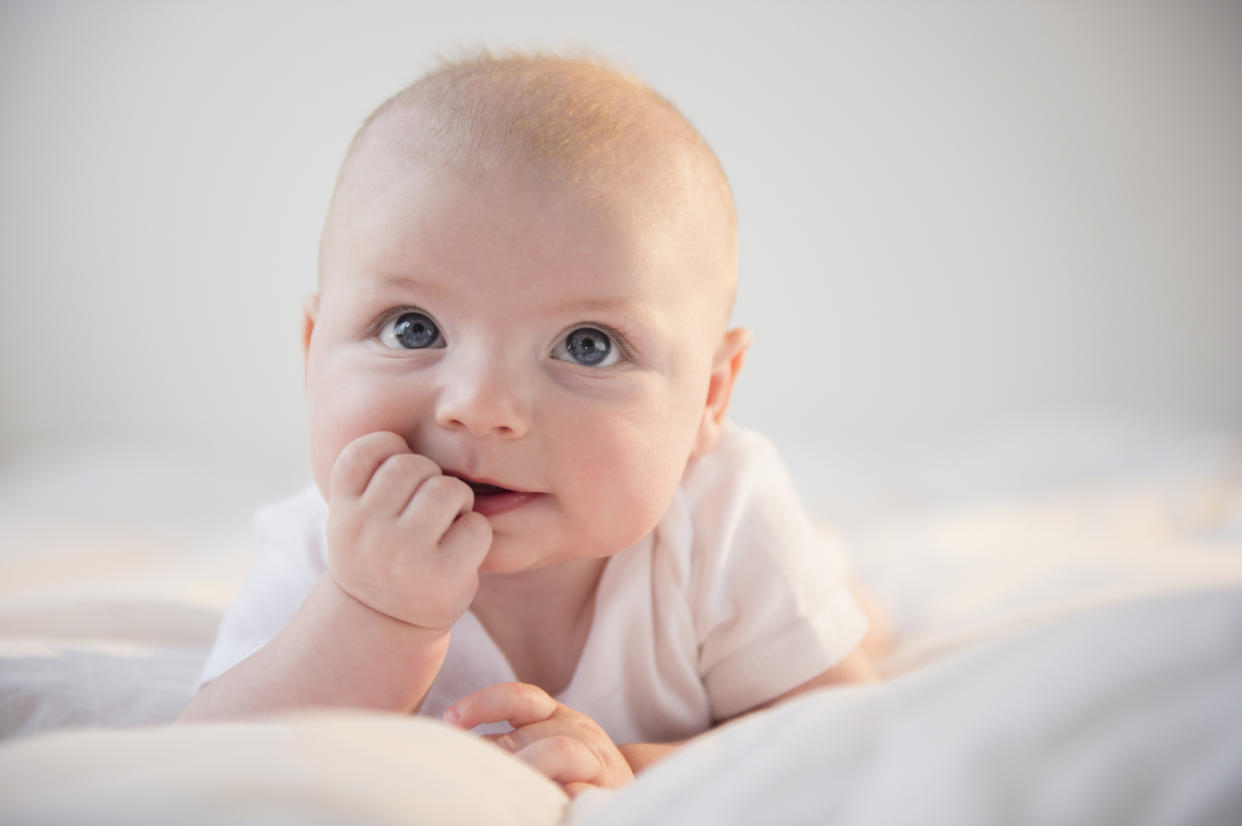Banned baby names from around the world, from Lucifer to Nutella

You might think that choosing a baby name is down to the parents, but it turns out there are some monikers mums and dads actually can't give their newborns.
Yep, that’s right, there are actual banned baby names.
One Australian mum who named her newborn son Citizen discovered that the unusual moniker could “possibly be illegal.” And she’s certainly not the only parent falling foul of the baby naming bods.
Back in 2017, a couple was banned from naming their newborn son ‘Amber’ by French authorities, while another were banned from naming their baby girl, Liam.
Another couple had to put up a four-year-fight to name their son Yoda from the Star Wars film franchise after an objection from the civil registry office and language council.
Baby name expert SJ Strum from the Baby Names Envy podcast says the UK is one of the world’s most relaxed societies when it comes to naming babies.
"We have over 50,000 different baby names in use and that total is climbing each year as parents invent individual and creative names for their child," she tells Yahoo UK.
“In the UK, there is no law restricting names, but monikers that contain obscenities, numerals, misleading titles, or are impossible to pronounce are likely to be rejected by the Registering Officer, when registering a birth."
However, many countries do have strict rules usually to protect a child from a name which could be deemed offensive or embarrassing in that society.
“Australia bans symbols in names while in New Zealand you can’t use a name which is an official rank, like Saint or Royale," Strum explains.
"Both Hungary and Iceland go a step further with a list of official names parents can choose from while some countries promote traditional spellings of names rather than ones from the West or Arabic culture.
“However, names will continue to change to reflect the change in culture and are a dynamic form of history in action – so they really do carry a lot of meaning to both the family, child and the wider world.”
Read more: 10 nature-inspired baby names on the rise in the UK
So where does this ban on certain baby names originate?
In 2011, the Pope declared war on parents naming babies after celebrities, fruit or, er, popular sports cars.
In an address to parents, he implored worshipers to try to “give your children names that are in the Christian calendar”.
The Pope isn’t the only figure of authority to clamp down on monikers that fall into the should-not-be-allowed list, however.
In fact, various baby names have been banned around the world for reasons of taste, decency or just plain silliness.
Banned baby names
Metallica
Maybe these Swedish parents were huge fans, but when they tried to give their daughter an ode to their favourite heavy metal band, officials outlawed it, deeming it inappropriate.
Miatt
Germany has an entire department (the Standesamt) which decides if names are suitable for just-borns. Miatt was rejected because it didn’t clearly show whether the child was a boy or a girl, which wouldn’t go down particularly well in today’s gender-neutral times.
Read more: Scientists reveal most beautiful baby names - and why they're deemed attractive
Ovnis
If you’re thinking of having a baby in Portugal, you’d be wise to consult this mammoth, 80-page government doc (and have it translated to English) which tells you which names you can and can’t use.
It’s pretty strict, and a bit on the confusing side – Tomás is OK but Tom isn’t – and Ovnis which is Portuguese for UFO is definitely on the banned list.
Nutella
Back in 2015 a court in Valenciennes, France, decided that a couple would not be allowed to name their daughter ‘Nutella’.
The judge ruled that it wouldn’t be in the child’s best interest to be named after a chocolate spread.
“The name ‘Nutella’ given to the child is the trade name of a spread,” the court’s decision read, according to a translation.
“And it is contrary to the child’s interest to be wearing a name like that can only lead to teasing or disparaging thoughts (sic).”
Read more: The top 75 old money baby names
In today’s Internet-obsessed society it was only a matter of time before someone tried to name their child after a social media site. The state of Sonora in Mexico banned parents naming their baby Facebook because it is “derogatory, pejorative, discriminatory or lacking in meaning.”
The same state has also banned the names Robocop, James Bond, Circumcision, Traffic and Lady Di. (Diana IS allowed though).
@
Before you roll your eyes, the meaning behind this is actually kind of cute. In China the @ symbol is pronounced ‘ai-ta’ and carries the meaning ‘love him’. Still authorities didn’t think the name was appropriate and outlawed it.
Ikea
Parents in Sweden wanting to name their children after the country’s Scandinavian-inspired superstore could find themselves falling foul of the country’s naming law, enacted in 1982.
The law was originally created to keep families from naming their kids after Swedish royalty, but now applies to the iconic store for reasons of name-related awkwardness.
J
Turns out Swiss naming authorities aren’t keen on initials as first names. When parents tried to pay tribute to two grandparents, Johanna and Josef, with the name J, the court in Switzerland suggested Jo instead.
Read more: How to choose a baby name, from banned options to the top choices
Gesher AKA ‘Bridge’
Back in 1998 Norwegian authorities jailed a woman for two days when she failed to pay a fine for giving her son an “unapproved” name.
The name? Gesher, which is Hebrew for ‘Bridge’. The mum said she was instructed in a dream to give her son the moniker, but the court were having none of it.
Cyanide
Back in 2017 a Welsh mother was banned by a high court from calling her baby daughter Cyanide (her twin brother was named Preacher).
Despite her arguments that Cyanide was a "lovely, pretty name" the court ruled that the "unusual" choice might harm the child growing up.
“It is hard to see how…the twin girl could regard being named after this deadly poison as anything other than a complete rejection of her by her birth mother,” Justice Eleanor King said.
Watch: Unusual celebrity baby names you'll want to steal
Saint
The moniker that Kim Kardashian and Kanye West chose for their son may have been fine in the US, but, in New Zealand, where you can’t give your kids names that resemble official titles, it’s not ok.
In 2018 three sets of parents had this name rejected by the naming officials within the government.
Daemon
A French couple, were keen to name their child after the character of Damon from The Vampire Diaries (who isn’t a Damon fan?). They added an ‘e’ to make it sound more French, but authorities banned it for sounding too demonic.
Talula Does the Hula From Hawaii
No jokes! This unique moniker belonged to a nine-year-old girl from New Zealand before a judge had her renamed during a custody battle.
“It makes a fool of the child,” he said.
Akuma AKA ‘Devil’
In 1993 a Japanese parent called, or should we say tried to call, his son Akuma (which literally means Devil).
The authorities decided this was an abuse of the parent’s rights to decide a child’s name. Eventually the father backed down and his son was given a new, less demonic name.
Chow Tow AKA Smelly Head
While some countries are gradually loosening their name laws, Malaysian authorities have been clamping down on unsuitable titles in recent years, particularly those that aren’t in keeping with the religious traditions of the country. Case in point: Cantonese moniker Chow Tow, which means ‘Smelly Head’.
Snake
The 2006 tightening of Malaysia’s naming restrictions also meant the banning of Hokkien Chinese Ah Chwar, which means ‘Snake.’
Jihad
In 2017, a family in France caused a dilemma when attempting to call their child Jihad. The parents chose the controversial baby name for their little one and officials immediately alerted the public prosecutor.
Despite the controversy Arabic experts say Jihad actually means struggle, effort or self-denial instead of holy war, which the word is often used for. Other babies in France have also previously been given the divisive name.
Read more: The top 20 baby names Brits wish they had been given – including Jack and Lily
Peppermint
Germany has certain criteria for baby name bans. Pfefferminze ("Peppermint") was rejected because it might cause ridicule. Equally, the moniker Stone was outlawed due to the fact that “a child cannot identify with it, because it is an object and not a first name.”

Linda
In 2014, the relatively inoffensive sounding Linda made Saudi Arabia’s banned baby names list, thanks to its association with Western culture.
Fañch
Back in 2017 a French court ruled a couple could not use the moniker Fañch that they’d chosen for their baby.
The court in Quimper, north west France ruled that the new parents would not be able to use the character ñ (called a tilde) in their baby’s name.
Google dictionary describes the character as an accent (~) placed over Spanish n when pronounced ny (as in señor) or Portuguese a or o when nasalised (as in São Paulo).
Venerdi
In 2008 a court banned an Italian couple from calling their baby Venerdi, which translates to Friday. But although naming a baby after the best day of the week doesn’t sound that bad, the judges believed the name, taken from Robinson Crusoe, would expose the child to “mockery” and was associated with “subservience and insecurity”.
Fraise
When a French couple attempted to name their child after the popular fruit, the courts claimed that the name ‘Fraise’ would incur teasing. The parents insisted that they were only trying to give their little one an original name, and eventually went with 'Fraisine' instead.
Lucifer
HuffPost reported that a court in Germany had intervened when a couple tried to call their child Lucifer. And they’re not the only officials to outlaw the name, the department of internal affairs in New Zealand also decided to ban this moniker, and we can sort of see why.
Read more: As unusual baby names surge, 10 unique options for your child
Anus
We guess no one’s really wondering why this name was banned, but yep some poor kid in Denmark was very nearly named after this particular part of the human anatomy. Unsurprisingly the application was denied.
Brfxxccxxmnpcccclllmmnprxvclmnckssqlbb11116
No, we didn’t just nod off on the keyboard. That is an actual name a Swedish couple tried to give their baby back in 1996.
Apparently the name is pronounced “Albin” (yeah, we’re not sure how either), and the parents chose it as a protest against Sweden’s strict naming laws.
Sarah
Moroccan authorities banned this spelling of Sarah as its considered to be the Hebrew version. But spelt with no ‘h’, aka ‘Sara’, is fine as that’s the Arabic version.



